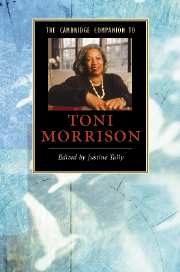Book contents
- Frontmatter
- Introduction: “All necks are on the line”
- Part I Toni Morrison’s fiction
- Part II Toni Morrison’s criticism and editing
- Part III Essays
- 11 Language and narrative technique in Toni Morrison’s novels
- 12 Toni Morrison, intellectual
- 13 Morrison and the critical community
- Part IV Further Reading
- Index
12 - Toni Morrison, intellectual
from Part III - Essays
Published online by Cambridge University Press: 28 January 2008
- Frontmatter
- Introduction: “All necks are on the line”
- Part I Toni Morrison’s fiction
- Part II Toni Morrison’s criticism and editing
- Part III Essays
- 11 Language and narrative technique in Toni Morrison’s novels
- 12 Toni Morrison, intellectual
- 13 Morrison and the critical community
- Part IV Further Reading
- Index
Summary
A dead language is not only one no longer spoken or written, it is unyielding language content to admire its own paralysis. Like statist language, censored and censoring. Ruthless in its policing duties, it has no desire or purpose other than maintaining the free range of its own narcotic narcissism, its own exclusivity and dominance.
The systematic looting of language can be recognized by the tendency of its users to forgo its nuanced, complex, mid-wifery properties for menace and subjugation. Oppressive language does more than represent violence; it is violence; does more than represent the limits of knowledge; it limits knowledge . . . Sexist language, racist language, theistic language - all are typical of the policing languages of mastery, and cannot, do not permit new knowledge or encourage the mutual exchange of ideas.
Nobel Lecture, 268, 269Though perhaps best known to most as the first African American Nobel laureate in literature, it would be short-sighted - as evidenced by the other essays in this volume - to limit Toni Morrison's incredible contributions to the world of arts and letters to her achievements as a novelist alone. The author of scores of critical essays and articles, published speeches, book reviews, interviews, opinion pieces; author of Playing in the Dark: Whiteness and the Literary Imagination; editor of both Race-ing Justice, En-Gendering Power: Essays on Anita Hill, Clarence Thomas, and the Construction of Social Reality and Birth of a Nation'hood: Gaze, Script, and Spectacle in the O. J. Simpson Case; and a professor of writing and literature for decades, Morrison's record, role, and influence as an intellectual are by any measure extraordinary. Indeed, it could be argued that Morrison's corpus is best understood when read as a broad, far-reaching intellectual contribution that defies our contemporary artist-scholar divide with which we have become increasingly comfortable in the academy.
- Type
- Chapter
- Information
- The Cambridge Companion to Toni Morrison , pp. 162 - 174Publisher: Cambridge University PressPrint publication year: 2007
- 1
- Cited by

